|

The General Prologue
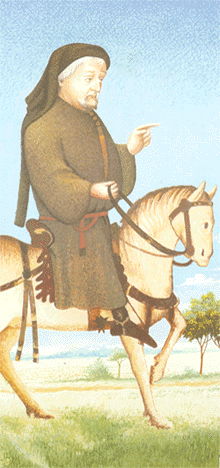 |
|
|
Time:
April/ spring day
Place:
Southwark, at the Tabard Inn on their way to Canterbury
The narrator
Chaucer portrays the 29 Canterbury pilgrims.
|
|
| The knight: perfect and genteel man who loved truth,
freedom, chivalry and honor. The most socially
prominent person on the journey; the battles he fought were all religious
wars of some nature.
|
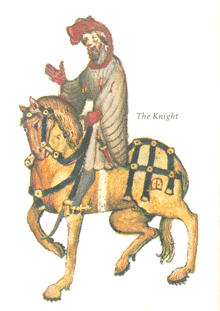 |
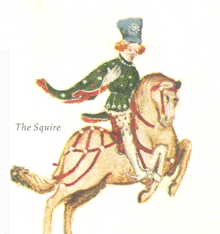 |
The Squire: a candidate for knighthood; a lover who can sing
lusty songs, compose melodies, poetry
|
| Yeoman: dressed in green; an expert woodsman, an excellent
shot with the bow/ arrow.
|
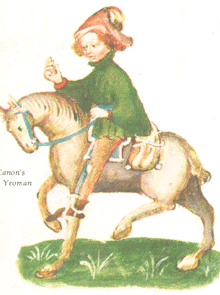 |
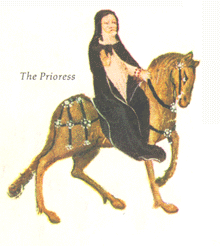 |
Prioress: Madame
Eglantine; a gentle lady; well-educated though her French wasn't accepted
Parisian French. Coy and delicate;
table manner; More a woman than a nun! Without vocation but with the dogs
and jewelry that satirical literature always condemns nuns for. Associates
of the Prioress: 3 priests and another nun
|
| Monk: a
lover of hunting, fine foods; bald headed, ugly, fat; dressed in fine
clothes. Favorite food was a
roasted swan. No other monk is more worldly than he is. Here Chaucer
demonstrated his use of irony: Chaucer selects and arranges his material so that
the reader can come to a conclusion about the
character. When the monk says that he doesn't approve of the solitary prayerful existence
in a monastery, Chaucer pretends to be convinced that
the Monk's argument is right. Everything that
the monk does is a violation of his monastic orders. His love of the worldly goods,
food, and pleasure, and his dislike of
the quiet monastery contradict his religious vows.
|
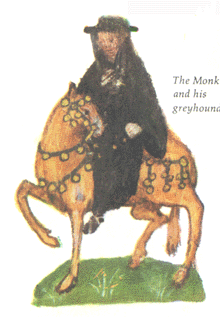 |
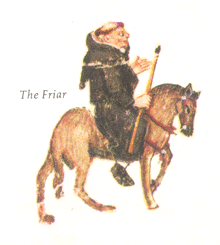 |
Friar: Hubert
--a wanton and merry man who had helped many girls get married after he
got them in trouble. Chief
butts of medieval satirists; knowing the taverns and inns better than the leper houses and almshouses. Chaucer says there was no better man than
the Friar when it comes to the practice of his profession. Always able to
get money from people (thru every vicious and immoral method). The
best of his type--scoundrel.
|
| Merchant: rich
and powerful rising middle class; shrewd; knew how to bargain;
well-dressed. No one would tell he was
deeply in debt.
|
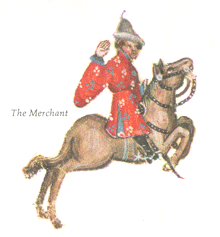 |
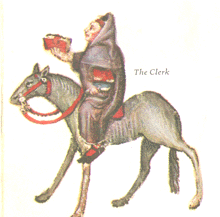 |
Clerk: student
at Oxford; extremely thin on a thin horse; threadbare clothes; quiet; a
real scholar
Next to the knight, he is one of the most admired
people on the pilgrimage.
|
| Sergeant
of Law: able attorney;
makes people think that he is busier and wiser than he really is.
|
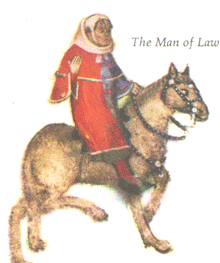 |
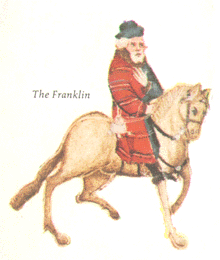 |
Franklin: a
large landowner with wealth, but not of noble birth. Red face and white
beard; enjoys good living; generally liked by
the other pilgrims. The Haberdasher, the Dyer, the Carpenter, the Weaver,
and the Carpet maker: belong to a guild
|
| Cook: a master of his trade; good at cooking, but he has
a running sore on his shin, because his best dish was a creamed chicken
pie whose white sauce might be the same color as the pus from the sore.
|
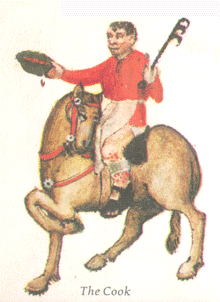 |
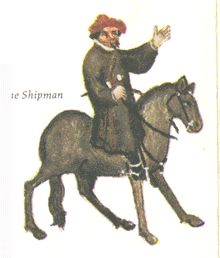 |
Shipman: a huge man, uncouth; a master of vessel and knew
all the ports; not ride well; like a fish out of water as sat on his
horse.
TOP |
| Doctor of Physic: know
astronomy (astrology) and something of nature; but nothing of the Bible.
Made a lot of money during the plague; love
gold
|
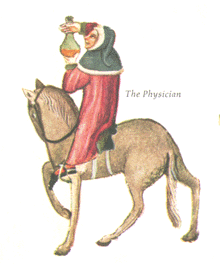 |
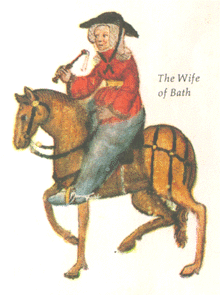 |
Wife of Bath: a
bit deaf, excellent seamstress and weaver; married 5 times; with
aggressive feminism; in fancy/colorful
clothes: scarlet red stockings; gap-toothed; amorous; laugh and joke
|
| Parson:
poor, but rich in holy
thoughts and works; live the perfect life first and then teach it. True Christian priest; Amid the worldly clerics and the
false and superficial religious adherents, the poor parson stands out as
the ideal portrait of what a parish priest should be.
|
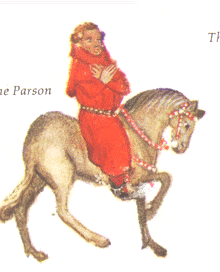 |
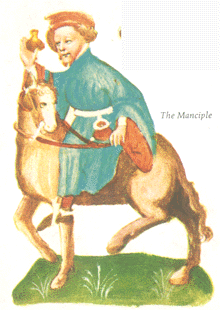 |
Manciple: steward for a law school (a dorm for lawyers) in London;
cunning, though unlettered; cheating the
well-educated lawyers by putting aside a tidy little sum for himself.
|
| Miller: a big brawny man to outwrestle any man/ even a ram. Short
shouldered, broad and thick set; red beard, a wart on his nose from which
bristly red hairs protruded made him look fearful. Play the bagpipes
as the pilgrims left the town. (He tells a dirty story about a carpenter
John.)
|
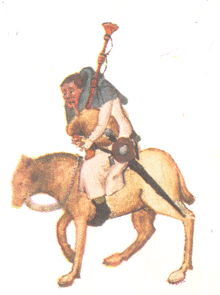 |
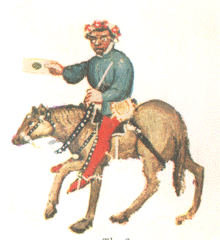 |
Summoner: ugly:
fire-red complexion, pimples and boils, a scaly infection around the
eyebrows, and a moth-eaten beard; loves
garlic, onions, leeks, and strong wine; speaking Latin to show off. His physical appearance fits his profession well since he is paid to summon
sinners for a trial before a church court. He is so ugly and gruesome looking that a
summon from him is in itself a horrible experience. Chaucer
ironically implies that he is a good fellow because sinners could easily bribe him. The reader should be aware of these subtle ironic statements which
are often made in paradoxical
situations.
|
| Pardoner: a
church official who had authority from Rome to sell pardon and indulgence
to those charged with sins. Hypocrite,
phony, ugly but in fashionable clothes--loud, high-pitched voice, greed, big eyes, yellow hair, beardless (a "gelding or a mare");
sing and preach so as to frighten everyone into buying his
pardons at a great price. One of the most corrupt of the churchmen. In the prologue to his tale, he confesses to his hypocrisy. Chaucer implies
that he is not really a man, that he is
either sexually impotent or perverted.
|
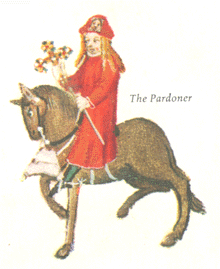 |
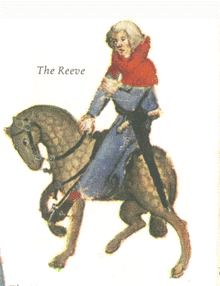 |
Reeve:
manager of a large estate. Shrewd,
businesslike, capable; cheating his lords by lending him what was his own; A
skinny man/ bad temper; ride last (in the back)--suspicious, trusting
nobody. Once a carpenter, he feels the need for revenge by telling a dirty
story about a miller later. |
| Plowman: a
small tenant farmer, but the ideal Christian man; honest with neighbors;
paid his tithes |
The
Host:
Harry Bailey; a merry
man suggests that, to tell stories to shorten the long journey--two
tales on the way to Canterbury and two more tales on the way back; the man
who told his story best was to be given a sumptuous dinner by the other
members of the party--a good strategy to make money
3 people who draw lots first: the prioress, the clerk, knight--they're
good and able to start story-telling |
Image Source: The Pilgrims in the Ellesmere Manuscript of
Chaucer's Canterbury Tales. San Marino: The Henry E. Huntington Library
and Art Gallery
General
Introduction
The Prologue
gives an admirable description of the uncomplicated life of England in the
Middle Ages. Here are portraits
of all levels of English life. In this group Chaucer brings together all of
the foibles
and virtues of man and the manners and morals of his time with remarkable
clarity. Through The Prologue Chaucer alternately praises or chides the
travelers with deftly drawn word portraits which provide insights into the life of his
time. Influenced by Boccacio's Decameron,
Chaucer uses the device of the religious pilgrimage to bring together such a
diverse group. The shrine of St. Thomas a Becket to which the pilgrims are going
was reputed to have great healing qualities. Some of pilgrims are going for
health rather than religious reasons. W of Bath was a little deaf; Pardoner was
beardless; the cook, a sore; summoner, boils and other skin trouble; Miller, an
awful wart on his nose; the reeve was choleric, etc.
Study Questions on Chaucer I
on "The General
Prologue":
1. Describe the narrative voice of "The
General Prologue."
2. How does Chaucer use physical description to show his attitude
towards the characters? Give examples.
3. According to what you have read, what qualities is Chaucer
intolerant of? Use specific examples.
4. What qualities does Chaucer most admire? How does he show his
admiration?
5. What does Chaucer reveal about his society through his
description of his pilgrims and their journey?
|






















